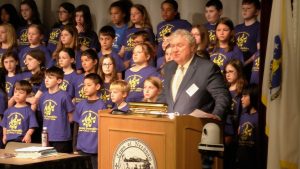April 20, 2023
• Fourth graders at Sunita Williams Elementary School learn how to reduce their usage of single-use plastics.
reported by Yuxiao Yuan
The invention of plastic has led to so many advancements in modern life, that it is difficult to imagine a life without it. Yet as a society we are growing to be more aware of the downside to plastics, and are learning that we have become too dependent on it’s convenience in light of the impact it has on the environment. In the week’s leading up to Earth Day, students and staff at the Sunita Williams Elementary School have taken action to reduce plastic waste. On April 13th, that effort was marked by a plastic-free lunch day.
The cafeteria busted with excitement, as students enjoy their “plastic-free” meals. Many of them brought silverware from home instead of using plastic utensils and drank from reusable water bottles instead of single-use plastic bottles. The district’s nutrition staff also replaced the usual single-use condiments with ketchup pump dispensers.
This event was not just an isolated occurrence. Throughout the year, students have been learning about the importance of sustainability, and why our behaviors need to change for the betterment of the environment.
“I learned that plastic hurts the environment, since it’s not biodegradable and instead it turns into microplastics, and animals mistake it for food and get sick,” explains 4th grader Remy Park.
His classmate, Masama Moadam described the plan. “As we learned this year, plastic’s hurting the environment and we want to stop it. Stop using single-use plastic, so it does’t hurt the environment as much.”
“Single-use plastic is really what we’re focused on specifically. A single-use plastic is just that, it’s made for one single use and then thrown away.” George Goneconto, a 4th grade teacher at Sunita Williams Elementary School, shared that plastic reduction is the theme of the service learning project for his class this year. The class has partnered with local non-profits, such as Green Needham, and has incorporated interactive learning activities to engage students in understanding the effect of plastic waste. “Kathy Raiz from Green Needham was super supportive and she came to our class and did a slideshow presentation, all about reducing plastic and its harmful effects on the environment.”
“We took that and we then did a number of activities in the classroom to learn about plastic, the kids did some research, and then we decided that some way to make a real impact is to have a plastic-free lunch.” he continued.
Towards the end of the lunch, Goneconto showed students the collective impact they made with just one plastic-free meal. “We would collect plastic utensils and measure how much plastic utensils we use on a normal day compared to how many plastic utensils we use on a plastic-free lunch day. With this awareness-building campaign that we’ve done, we’re gonna spread the word–not just to Sunita, but to other surrounding schools. The hope is that we can have a plastic-free lunch more often.”
“One of the kids just came up to me and said, ‘Mr. G, this is awesome. Why can’t we have a plastic-free lunch day every day?’ So that tells me that already we’ve made an impact.”
The efforts of these fourth graders did not stop at the school gates. They have taken that message outside of school as well. They took the stage at the School Committee meeting in March where they sang about reusable bags, and just the day before the plastic-free lunch day, they gave away shopping bags they sewed using donated t-shirts at the Select Board meeting.
Narra Amos was pleased with the experience. “I told my parents what we did, that we sewed the reusable bags. They thought it was a great idea, and then they would be singing the song every time they’d get the reusable bag and go to the shopping area.”
Classmate Charlie Cloutier agreed that this is just a start. “We would sing a song. It wasn’t much,
but I think it was important, because plastic hurts our world.”
• Fourth graders at Sunita Williams Elementary School learn how to reduce their usage of single-use plastics.










More Stories
ZBA Deliberates Tight Fit on Chestnut Street
Envision Needham Finds Resistance
Needham Open Studios Turns 25